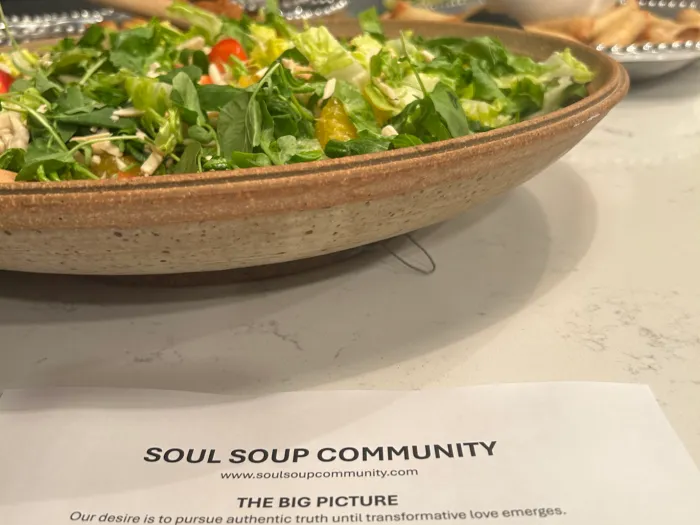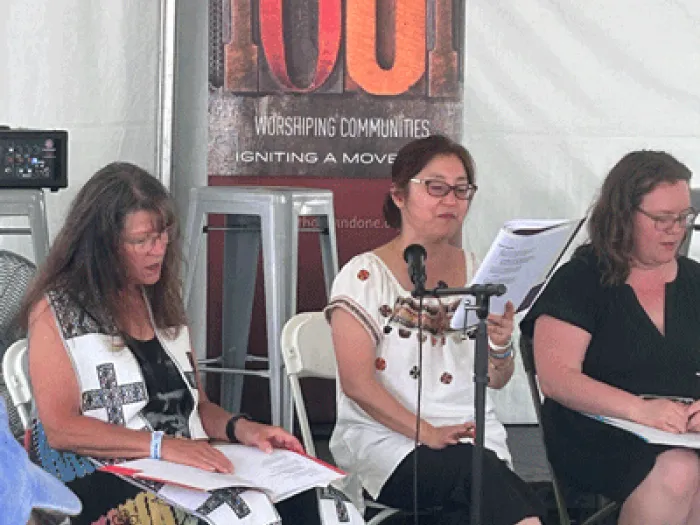The “Yes! In God’s Backyard” approach to affordable housing
Podcast guests discuss developing church property.

“Here is the church, here is the steeple; open the doors, and … wait a second — the people have been priced out of the neighborhood,” the Rev. Sara Hayden said in her introduction to a recent episode of the “New Way” podcast.
“Affordable housing is just one of the vexing challenges facing communities today,” Hayden, an associate in the 1001 New Worshiping Communities Movement, said before introducing two pastors in the Los Angeles area who are examining the complexities around affordable housing and finding local solutions. In the two-part series produced by the Rev. Marthame Sanders, Hayden sat down with the Rev. Carlton Rhoden, a longtime community organizer and pastor of Westminster Presbyterian Church, and the Rev. Victor Cyrus-Franklin, the supervising pastor for affordable housing development of Inglewood First United Methodist church and the newly appointed senior pastor of Holman United Methodist Church.
Upon arriving as pastor in 2017, Cyrus-Franklin saw the challenges his community was facing and hit the ground with advocacy around rent control as neighbors were rapidly being priced out of their residences. This included a member of the Inglewood Unified School District who had to resign from her post when she could not find an affordable rental unit in the city. The church joined with LA Voice, a multi-racial and multi-faith organization, and others to get a 5% rent cap passed in the city. When the church was forced to close a charter school on its property, it began to explore ways to meet the needs of the congregation and the community through a partnership with a developer of affordable housing. The process has taken over five years for reasons the podcast touches on and lifts up its commonalities in regard to housing policies and development challenges across the nation, but the church and its partner developer expect to break ground in March 2025.

Rhoden had a background in faith-based community organizing before he accepted the call to serve as senior pastor of Westminster Presbyterian Church 10 years ago. “I understand the mechanics of how to build power and how to create power through community organizing,” said Rhoden, who considered how his aging congregation was being called to leverage their power for good in their community. Westminster owned various properties, including a parking lot, a commercial building and a manse as well as the church facilities. Rhoden began to dream of ways to create affordable housing and church sustainability in the neighborhood. In the 1980s, Westminster had already developed a parcel of land into affordable senior housing, but due to U.S. Department of Housing and Urban Development (HUD) restrictions, members were not guaranteed units, which are managed through a lottery system. “We don’t have any members living in that facility, but it’s a wonderful facility, and it gave them a history and a background of building senior affordable housing,” said Rhoden.
Both congregations were founded 120 years ago and have developed a legacy of social justice throughout their history as the congregations reflected and responded to the neighborhoods and the challenges they faced. “Westminster is the oldest African American Presbyterian church west of the Mississippi,” said Rhoden. “Being Black and Presbyterian, you better know how to organize, and then being able to establish yourself for 120 years, you better be good at it.”
Cyrus-Franklin started the story of his Methodist congregation with the land theft from Indigenous people in California by saying that “many Protestant churches were moving out West to acquire real estate at bottom dollar to help build these communities.” Inglewood First United Methodist Church was incorporated before the city of Inglewood. When the diocese appointed its first Black pastor during the desegregation era of the 1970s, Black Americans from the South and Pacific Islanders from Tonga joined the congregation and shaped its identity and mission, which is now even more multicultural. “Building affordable housing is a decolonial project,” said Cyrus-Franklin, “because it’s about a base of community, a base of power, a base of hope for people who have been displaced over generations and can regenerate and re-create and self-determine community going into the future.”

Later in the series, Rhoden and Cyrus-Franklin address some of the red tape and obstacles that their congregations have encountered in trying to push back against the Not-In-My-Backyard (NIMBY) movement and to respond in turn with a “Yes, In God’s Backyard (YIGBY)” charge. “We’re stewards of these resources,” said Cyrus-Franklin. “Being a good steward, how can we help serve all Creation and serve God’s people?”
“There are all these hoops that you have to jump through and hurdles that are placed in front of you that you kind of have to continue to pray through, continue to work through,” said Rhoden, who affirms that the journey, though long, is worthwhile because it is about legacy-building. “We're planning for the next 50 to 75, maybe 100 years for the congregation. We don't want to mess it up; be patient.” Part of the collaboration between Rhoden and Cyrus-Franklin has been a better understanding of how the United Methodist Church and the Presbyterian Church (U.S.A.) handle property ownership as a whole and holding the denominational structures and mid council accountable to their part of the covenant with a congregation in regard to the future use, sale or development of church property.
"Although the church is small or the denominational structure is, we must understand that we still have power,” said Rhoden. “Our power comes from a source that is above and beyond what these market forces are. Not only that, we have power with God; we have power with each other. There's unity in power.”
Listen to both episodes and more of the “New Way” podcast produced by the PC(USA)’s 1001 New Worshiping Communities and Mudeif productions through the “New Way” podcast page.
You may freely reuse and distribute this article in its entirety for non-commercial purposes in any medium. Please include author attribution, photography credits, and a link to the original article. This work is licensed under a Creative Commons Attribution-NonCommercial-NoDeratives 4.0 International License.




